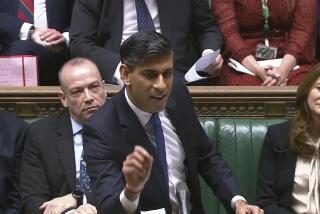South Korean lawmakers try first filibuster since 1969 to block anti-terrorism bill
Wearing a white sweater and a blue blazer, her eyes framed by round spectacles, Eun Soo-mi looked more like a librarian than a political saboteur as she approached the podium in South Korea’s parliament at 2:30 a.m. on Wednesday.
With the quiet resolve of an endurance athlete, the 52-year-old member of the Minjoo Party embarked upon her mission: to speak for 10 hours as part of opposition lawmakers’ effort to block a vote on controversial anti-terrorism legislation with a filibuster – a highly unusual move that South Korea hasn’t seen in more than 45 years.
Lawmakers from the Saenuri Party, a conservative party that holds a majority in the chamber, repeatedly interrupted her, yelling for her to step aside and let the bill go to a vote. Saenuri Policy Chief Kim Jung-hoon accused her of turning South Korea’s parliament into an “international laughingstock.”
NEWSLETTER: Get the day’s top headlines from Times Editor Davan Maharaj >>
But Eun just kept going with her rambling monologue, mostly reading academic papers about anti-terrorism legislation. When interrupted, she simply made deadpan requests to her noisy opponents, flatly saying, “Please apologize.”
The decision by opposition lawmakers to resort to a rare filibuster – the first since 1969 – underscores the deep divide over the legislation.
The bill is ostensibly a response to recent provocations by North Korea, including a nuclear test and long-range rocket launch. Saenuri lawmakers and President Park Geun-hye have described the current situation as an “emergency” and argue that it is necessary to grant the National Intelligence Service, the country’s main spy agency, greater power to investigate people or organizations.
Saenuri holds 152 of 300 seats in parliament. If the measure were put to a plenary vote, it would almost certainly pass.
The legislation was first introduced after the 2001 terrorist attacks in the U.S. and has been languishing in parliament since then. Given North Korea’s latest antics, the ruling party contends that now is the time to step up security measures.
But the opposition claims that the agency’s powers should be curtailed, not expanded. Under parliamentary rules, there is no mandatory end to debate -- as long as someone keeps talking, the ruling party has no power to stop them. And that’s just what the opposition plans to do for the next two weeks.
For the filibuster to succeed, the lawmakers will have to keep up the chatter until March 11, when the parliamentary session is scheduled to end.
South Korean intelligence agencies have for years faced allegations of meddling in politics and overstepping their authority to snoop on the public.
In 2014, the former director of the National Intelligence Service was sentenced to three years in prison for leading a campaign that saw thousands of comments posted on online message boards ahead of the 2012 presidential election. The messages praised ruling party candidate (and now President) Park Geun-hye, while disparaging her liberal opponent, Moon Jae-in, as a North Korea-loving stooge.
A 2014 report by the International Crisis Group called on South Korea to rein in the NIS. “Efforts are needed to reform the South’s intelligence capacities, principally by depoliticizing its agencies and ensuring adequate legislative and judicial oversight,” the group said.
The filibuster began Tuesday evening, led off by five hours and 23 minutes of remarks by the Minjoo Party’s Kim Gwang-jin. Eun followed Kim with 10 hours and 18 minutes at the podium, setting the record for longest ever address in South Korean parliament. But she fell short of the mark set by Strom Thurmond, who carried out the longest ever filibuster by a U.S. senator, speaking nonstop for over 24 hours in an effort to filibuster the Civil Rights Act of 1957.
Eun’s only display of emotion was when she choked up talking about South Korean democracy icon and former President Kim Dae-jung, who as a young lawmaker in 1964 gave a speech in parliament that lasted more than five hours in an effort to block parliamentary approval of a fellow legislator’s arrest.
See more of our top stories on Facebook >>
South Korean politicians don’t always resolve their differences so peacefully. In the past, lawmakers have gotten into fistfights, thrown furniture and barricaded doors to prevent the passing of legislation.
In 2011, an opposition lawmaker tossed a tear gas canister at the main podium in a last-ditch effort to prevent the signing of a free trade agreement with the United States. Parliament was evacuated, but the bill passed anyway.
The ongoing filibuster attempt is a rare cooperative act by South Korea’s political opposition. In recent years, the main liberal party, now the Minjoo Party, has changed its name, and had many high-profile members defect amid infighting and electoral defeats.
Their suddenly united front may have something to do with having a common enemy.
“Resisting the expansion of the NIS’s discretionary powers is certainly something opposition lawmakers can rally behind, for now at least,” said Steven Denney, a Graduate Fellow at the Asian Institute at the University of Toronto and specialist on South Korean politics.
Borowiec is a special correspondent.
MORE FROM WORLD
Chinese social media platform plays a role in U.S. rallies for NYPD officer
I knew Beijing’s bad air was killing me slowly. But is it making me fat too?
North Korea will ‘collapse’ if it pursues nuclear weapons, South Korean president says
More to Read
Start your day right
Sign up for Essential California for news, features and recommendations from the L.A. Times and beyond in your inbox six days a week.
You may occasionally receive promotional content from the Los Angeles Times.






